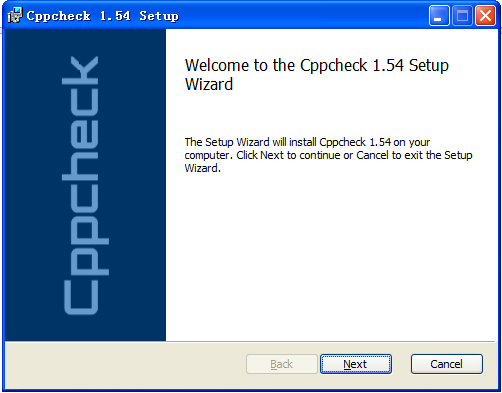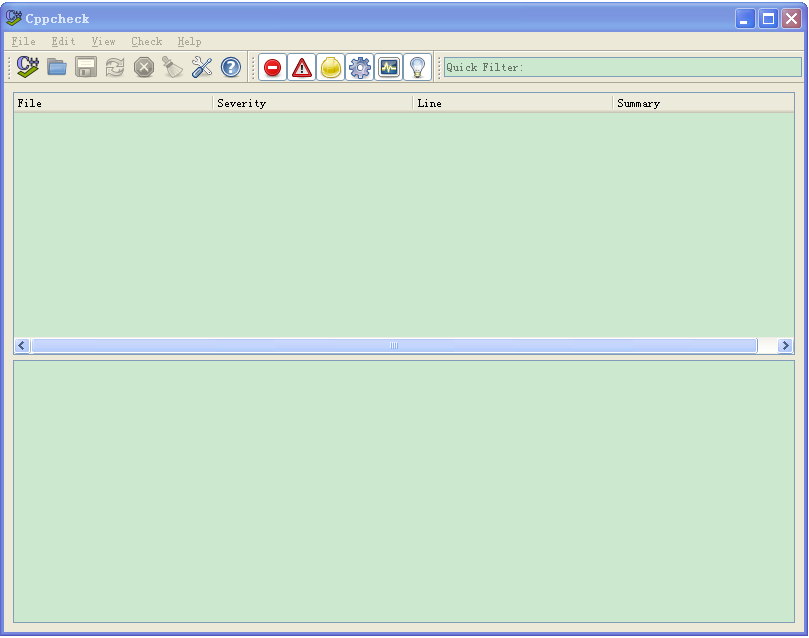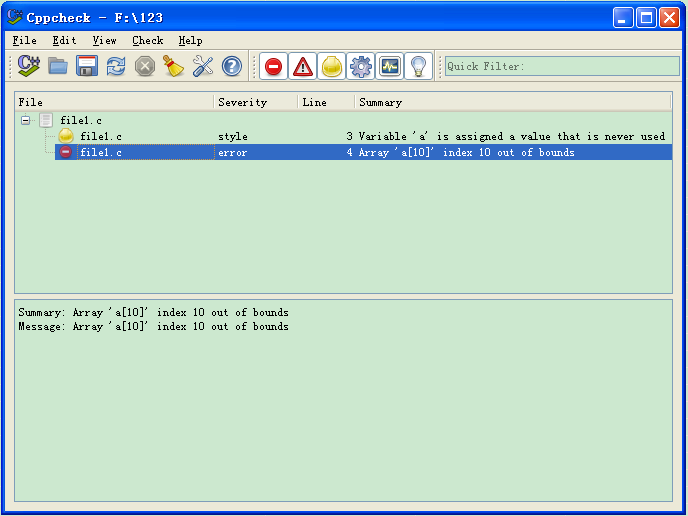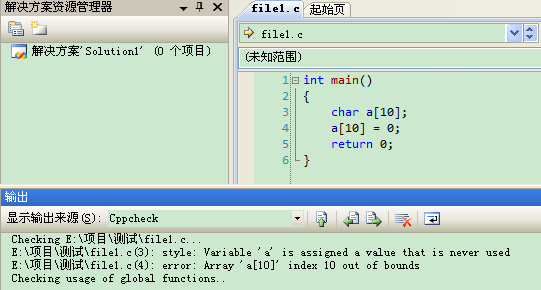Cppcheck 1.54 C/C++静态代码分析工具
2014-08-19 14:42
411 查看
Cppcheck 1.54 C/C++静态代码分析工具

Cppcheck是一个C/C++代码分析工具,只检测那些编译器通常无法检测到的bug类型。
官方上建议让编译器提供尽量多的警告提示:
1.使用Visual C++的话,应使用警告等级4
2.使用GCC的话,参看Warning options - using GCC
官方地址:http://cppcheck.sourceforge.net/
当前版本:1.54 for windows
安装界面如下:

安装完后,双击cppcheckgui.exe启动其GUI程序:

工具栏第一个按钮

可以添加检测的目录,但是这里不支持中文路径。测试官方的例子,新建一个文件file1.c,内容如下:
int main()
{
char a[10];
a[10] =0;
return
0;
}
用此工具进行检测,结果如下图所示:

一下子就分析出了其中的警告和错误。用命令行检测的话,可以支持中文路径,效果如下图所示:

命令行方式,默认只显示错误的信息,使用--enable打开其他提示信息,如下:
cppcheck.exe --enable=all"E:\项目\测试"
在Visual Studio下使用的话,步骤如下:
1.在Visual Studio菜单栏"工具"→"外部工具",点击"添加",内容如下:
标题:Cppcheck
命令:D:\Program Files\Cppcheck\cppcheck.exe
参数:--enable=all--template=vs $(SolutionDir)
勾选"使用输出窗口"
2.使用时,点击"工具"→"Cppcheck"即可,如下图所示:

双击提示内容,即可定位到所在行。
附录:
1.cppcheck命令行参数
Syntax:
cppcheck [OPTIONS] [files or paths]
If a directory is given instead of a filename, *.cpp, *.cxx, *.cc, *.c++, *.c, *.tpp, and *.txx files are checked recursively from the given directory.
| --append=<file> | This allows you to provide information about functions by providing an implementation for them. |
| --check-config | Check cppcheck configuration. The normal code analysis is disabled by this flag. |
| -D<ID> | By default Cppcheck checks all configurations. Use -D to limit the checking to a particular configuration. Example: '-DDEBUG=1 -D__cplusplus'. |
| -U<ID> | By default Cppcheck checks all configurations. Use -U to explicitly hide certain #ifdef <ID> code paths from checking. Example: '-UDEBUG' |
| --enable=<id> | Enable additional checks. The available ids are: * all Enable all checks * style Enable all coding style checks. All messages with the severities 'style', 'performance' and 'portability' are enabled. * performance Enable performance messages * portability Enable portability messages * information Enable information messages * unusedFunction Check for unused functions * missingInclude Warn if there are missing includes. For detailed information, use '--check-config'. Several ids can be given if you separate them with commas. See also --std |
| --error-exitcode=<n> | If errors are found, integer is returned instead of the default '0'. '1' is returned if arguments are not valid or if no input files are provided. Note that your operating system can modify this value, e.g. '256' can become '0'. |
| --errorlist | Print a list of all the error messages in XML format. |
| --exitcode-suppressions=<file> | Used when certain messages should be displayed but should not cause a non-zero exitcode. |
| --file-list=<file> | Specify the files to check in a text file. Add one filename per line. When file is '-,' the file list will be read from standard input. |
| -f, --force | Force checking of all configurations in files. If used together with '--max-ifdefs=', the last option is the one that is effective. |
| -h, --help | Print this help. |
| -I <dir> | Give path to search for include files. Give several -I parameters to give several paths. First given path is searched for contained header files first. If paths are relative to source files, this is not needed. |
| --includes-file=<file> | Specify directory paths to search for included header files in a text file. Add one include path per line. First given path is searched for contained header files first. If paths are relative to source files, this is not needed. |
| -i <dir or file> | Give a source file or source file directory to exclude from the check. This applies only to source files so header files included by source files are not matched. Directory name is matched to all parts of the path. |
| --inline-suppr | Enable inline suppressions. Use them by placing one or more comments, like: '// cppcheck-suppress warningId' on the lines before the warning to suppress. |
| -j <jobs> | Start [jobs] threads to do the checking simultaneously. |
| --max-configs=<limit> | Maximum number of configurations to check in a file before skipping it. Default is '12'. If used together with '--force', the last option is the one that is effective. |
| --platform=<type> | Specifies platform specific types and sizes. The available platforms are: * unix32 32 bit unix variant * unix64 64 bit unix variant * win32A 32 bit Windows ASCII character encoding * win32W 32 bit Windows UNICODE character encoding * win64 64 bit Windows |
| -q, --quiet | Only print error messages. |
| -rp, --relative-paths -rp=<paths>, --relative-paths=<paths> | Use relative paths in output. When given, <paths> are used as base. You can separate multiple paths by ';'. Otherwise path where source files are searched is used. We use string comparison to create relative paths, so using e.g. ~ for home folder does not work. It is currently only possible to apply the base paths to files that are on a lower level in the directory tree. |
| --report-progress | Report progress messages while checking a file. |
| --rule=<rule> | Match regular expression. |
| --rule-file=<file> | Use given rule file. For more information, see: https://sourceforge.net/projects/cppcheck/files/Articles/ |
| -s, --style | Deprecated, please use '--enable=style' instead |
| --std=<id> | Enable some standard related checks. The available options are: * posix Checks related to POSIX-specific functionality * c99 C99 standard related checks * c++11 C++11 standard related checks Example to enable more than one checks: 'cppcheck --std=c99 --std=posix file.cpp' |
| --suppress=<spec> | Suppress warnings that match <spec>. The format of <spec> is: [error id]:[filename]:[line] The [filename] and [line] are optional. If [error id] is a wildcard '*', all error ids match. |
| --suppressions-list=<file> | Suppress warnings listed in the file. Each suppression is in the same format as <spec> above. |
| --template='<text>' | Format the error messages. E.g. '{file}:{line},{severity},{id},{message}' or '{file}({line}):({severity}) {message}' Pre-defined templates: gcc, vs, edit. |
| -v, --verbose | Output more detailed error information. |
| --version | Print out version number. |
| --xml | Write results in xml format to error stream (stderr). |
| --xml-version=<version> | Select the XML file version. Currently versions 1 and 2 are available. The default version is 1. |
# Recursively check the current folder. Print the progress on the screen and write errors to a file:
cppcheck . 2> err.txt
# Recursively check ../myproject/ and don't print progress:
cppcheck --quiet ../myproject/
# Check only files one.cpp and two.cpp and give all information there is:
cppcheck -v -s one.cpp two.cpp
# Check f.cpp and search include files from inc1/ and inc2/:
cppcheck -I inc1/ -I inc2/ f.cpp
2.检测内容
64-bit portability
Check if there is 64-bit portability issues:assign address to/from int/long
Auto Variables
A pointer to a variable is only valid as long as the variable is in scope. Check:returning a pointer to auto or temporary variable
assigning address of an variable to an effective parameter of a function
returning reference to local/temporary variable
returning address of function parameter
Boost usage
Check for invalid usage of Boost:container modification during BOOST_FOREACH
Bounds checking
out of bounds checking
Class
Check the code for each class.Missing constructors
Are all variables initialized by the constructors?
Warn if memset, memcpy etc are used on a class
If it's a base class, check that the destructor is virtual
Are there unused private functions
'operator=' should return reference to self
'operator=' should check for assignment to self
Constness for member functions
Exception Safety
Checking exception safetyThrowing exceptions in destructors
Throwing exception during invalid state
Throwing a copy of a caught exception instead of rethrowing the original exception
exception caught by value instead of by reference
Match assignments and conditions
Match assignments and conditions:Mismatching assignment and comparison => comparison is always true/false
Mismatching lhs and rhs in comparison => comparison is always true/false
Detect matching 'if' and 'else if' conditions
Memory leaks (address not taken)
Not taking the address to allocated memory
Memory leaks (class variables)
If the constructor allocate memory then the destructor must deallocate it.
Memory leaks (function variables)
Is there any allocated memory when a function goes out of scope
Memory leaks (struct members)
Don't forget to deallocate struct members
Non reentrant functions
Warn if any of these non reentrant functions are used:crypt
ctermid
ecvt
fcvt
fgetgrent
fgetpwent
fgetspent
gcvt
getgrent
getgrgid
getgrnam
gethostbyaddr
gethostbyname
gethostbyname2
gethostent
getlogin
getnetbyaddr
getnetbyname
getnetgrent
getprotobyname
getpwent
getpwnam
getpwuid
getrpcbyname
getrpcbynumber
getrpcent
getservbyname
getservbyport
getservent
getspent
getspnam
gmtime
localtime
readdir
strtok
tempnam
ttyname
Null pointer
Null pointersnull pointer dereferencing
Obsolete functions
Warn if any of these obsolete functions are used:asctime
asctime_r
bcmp
bcopy
bsd_signal
bzero
ctime
ctime_r
ecvt
fcvt
ftime
gcvt
getcontext
gethostbyaddr
gethostbyname
getwd
index
makecontext
pthread_attr_getstackaddr
pthread_attr_setstackaddr
rand_r
rindex
scalbln
swapcontext
tmpnam
tmpnam_r
ualarm
usleep
utime
vfork
wcswcs
Other
Other checksAssigning bool value to pointer (converting bool value to address)
bad usage of the function 'sprintf' (overlapping
data)
division with zero
using fflush() on an input stream
scoped object destroyed immediately after construction
assignment in an assert statement
sizeof for array given as function argument
sizeof for numeric given as function argument
using sizeof(pointer) instead of the size of pointed data
incorrect length arguments for 'substr' and 'strncmp'
invalid usage of output stream. For example: std::cout << std::cout;'
wrong number of arguments given to 'printf' or 'scanf;'
double free() or double closedir()
C-style pointer cast in cpp file
casting between incompatible pointer types
redundant if
bad usage of the function 'strtol'
unsigned division
Dangerous usage of 'scanf'
passing parameter by value
Incomplete statement
check how signed char variables are used
variable scope can be limited
condition that is always true/false
unusal pointer arithmetic. For example: "abc" + 'd'
redundant assignment in a switch statement
redundant strcpy in a switch statement
look for 'sizeof sizeof ..'
look for calculations inside sizeof()
assignment of a variable to itself
mutual exclusion over || always evaluating to true
Clarify calculation with parentheses
using increment on boolean
comparison of a boolean with a non-zero integer
comparison of a boolean expression with an integer other than 0 or 1
suspicious condition (assignment+comparison)
suspicious condition (runtime comparison of string literals)
suspicious condition (string literals as boolean)
duplicate break statement
unreachable code
testing if unsigned variable is negative
testing is unsigned variable is positive
using bool in bitwise expression
Suspicious use of ; at the end of 'if/for/while' statement.
incorrect usage of functions from ctype library.
optimisation: detect post increment/decrement
STL usage
Check for invalid usage of STL:out of bounds errors
misuse of iterators when iterating through a container
mismatching containers in calls
dereferencing an erased iterator
for vectors: using iterator/pointer after push_back has been used
optimisation: use empty() instead of size() to guarantee fast code
suspicious condition when using find
redundant condition
common mistakes when using string::c_str()
using auto pointer (auto_ptr)
useless calls of string functions
Uninitialized variables
Uninitialized variablesusing uninitialized variables and data
Unused functions
Check for functions that are never called
UnusedVar
UnusedVar checksunused variable
allocated but unused variable
unred variable
unassigned variable
unused struct member
Using postfix operators
Warn if using postfix operators ++ or -- rather than prefix operator转载地址:/article/1899509.html
相关文章推荐
- 【开源工具】Cppcheck 1.54 C/C++静态代码分析工具
- Cppcheck 1.54 C/C++静态代码分析工具
- Cppcheck 1.54 C/C++静态代码分析工具
- Cppcheck 1.54 C/C++静态代码分析工具
- Cppcheck 1.54 C/C++静态代码分析工具
- Cppcheck 1.54 C/C++静态代码分析工具
- Cppcheck 1.54 C/C++静态代码分析工具
- Cppcheck(静态的C\C++代码分析的工具)
- C/C++代码静态分析工具 - cppcheck
- C++ 代码静态分析工具cppcheck【转】
- C++静态代码分析工具对比cppCheck与PreFast
- C++代码静态分析工具-Prefast 和 Fxcop
- C++代码静态分析工具-Prefast
- C/C++代码静态检查工具Cppcheck在VS2008开发环境中的安装配置和使用
- C/C++静态代码分析工具
- VS 2008中的C/C++静态代码分析工具Prefast
- 安全编码实践三:C/C++静态代码分析工具Prefast
- 安全编码实践三:C/C++静态代码分析工具Prefast
- C++代码静态分析工具-Prefast
- C/C++代码静态检查工具Cppcheck在VS2008开发环境中的安装配置和使用
